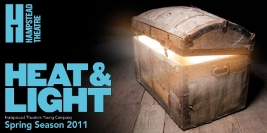 None of mathematically gifted characters who feature in Heat&Light’s collection of plays are happy. Maths does not seem to solve problems but create them. Life becomes a complex series of algorithms and equations.
None of mathematically gifted characters who feature in Heat&Light’s collection of plays are happy. Maths does not seem to solve problems but create them. Life becomes a complex series of algorithms and equations.
The pivot of the evening is delivered by writing mentor James Graham. The idea of everything in the world boiling down to probability and being explainable by maths serves as the stimulus for the young writers whose work is performed by fellow members of Heat&Lights’s 18-25 company.
Chatting with members of the company before the show, they view the evening’s plays as quite separate pieces. Working on the pieces individually, the company may not see the threads linking the plays, deftly tied together in a film directed by Steph Patten and written by Graham. The film serves as a bridge between the plays. Ricky Sharma’s voiceover is both witty and painfully bleak – a fantastically rough wakeup call that there is no such thing as fate and whatever we dream of accomplishing, we’ve already missed our chance.
The linking film delivers a dollop of clarity to Routes but having your programme in hand turns out to be the key to unlocking these plays. Status, age and relationships are indicated through snatches of costume in some plays but isn’t consistent throughout the evening. Sneaky peeks at the printed handout between scenes helped to establish some of the details that weren’t explained in the text.
Throughout the evening there is the immense preoccupation with the power of the self. Perhaps this is linked to an increases sense of awareness of both the self and others that comes when you start to make your own way in the world. Doppelgangers and quiet insanity roam large amongst these plays.
Mary Helen Walker’s play Check Mates is closely in dialogue with the mathsy stimulus. Joe Jamieson playing a chess came against his split personalities is both fun and unexpectedly insightful.
Moira (Jingan Young) is a cryptic piece, alluding to some of the juiciest imagery of the evening. Not even my trusty programme could help me identify the key relationship between the two women at the heart of the story. Alex Rand and Zia Ahmed have fun locking horns as competing love interests.
The evening’s puzzles continued with In the same space of Indifference. Olorunfemi Fagunwa’s drug dealer-come-composer is an interesting creation, played with sincerity by Stuart Birmingham. Elements of direction did not assist the bewildering text which leaped across locations and times. Christian Graham makes a good effort playing Mark/Frank/Charlie but whilst some performers appear in more than one piece, it isn’t clear if the multi-rolling in this piece is a creative or logistical decision. All I could glean from this curious triple-rolling was that one (or more) may (or may not) be dead and might (or might not) actually be same person. It’s a real shame this confusion exists as there is a great sense of a good play in there.
Shereen Jasmin Philips has written a play that is clearly understood and enjoyed by its cast. Sensitive and witty performances all round make Hidden one of the highlights of the evening. Seeing the reasoning of the emotionally bruised central character at different point in her relationship was really fascinating. Maths and probability took a back seat to some human emotion. Sandwiched in the middle of the evening where the source material is more palpable, you are left imagining a different play where the three actresses playing Charly follow different paths, Sliding Doors-style, tying in with the overarching ideas of the evening.
Princess in Waiting feels the most modern of the plays, not only for dealing with the upcoming Royal nuptials, but by avoiding the need to be bogged down in back story by dealing with well known real life figures and OTT caricatures. Tolula Dada’s play offers a portrayal of Kate Middleton’s pursuit of her prince at St Andrew’s University. Wills remains a pleasantly teasing offstage presence, allowing Kate to take centre stage. It’s sharp and funny and ties-in bizarrely well with ideas of probability and working for what you want. Many of the play’s best lines went unnoticed as an audience of mostly friends and family chortled at the antics of pals on stage.
There are three competing voices in Robin Hemming’s Height/Weight/Reach. There is a cool existential chess game between child genius Max and Hungarian chess expert Laszlo Polgar (not to be confused by the Hungarian opera singer of the same name!).
The performers chuck themselves into it all whole heartedly and there is a genuine excitement to be felt in waiting to see what’s going to come next. There is an absolutely brilliant feeling that the next big thing is about to be uncovered with every scene change. Restrictions of staging or script may not allow the Heat&Light cast to show us all they’ve got, but each commits to their roles. A few performers do stand out: Hussina Raja, Joe Jamieson, Stuart Birmingham, Melissa Horwood, and Ria Zmitrowicz.
Company members talk glowingly of their experiences putting Routes together; all are emphatic in congratulating Hampstead Theatre for the personal development it offers. Short sharp bursts of termly projects allow company members to take on day jobs, undertake part-time courses and attend auditions on top of taking on company projects, mixing with other young people looking to make an impact in the arts. It seems that writing and performance opportunities are just the tip of the Heat&Light iceberg with far more valuable experiences going on in the rehearsal room.
